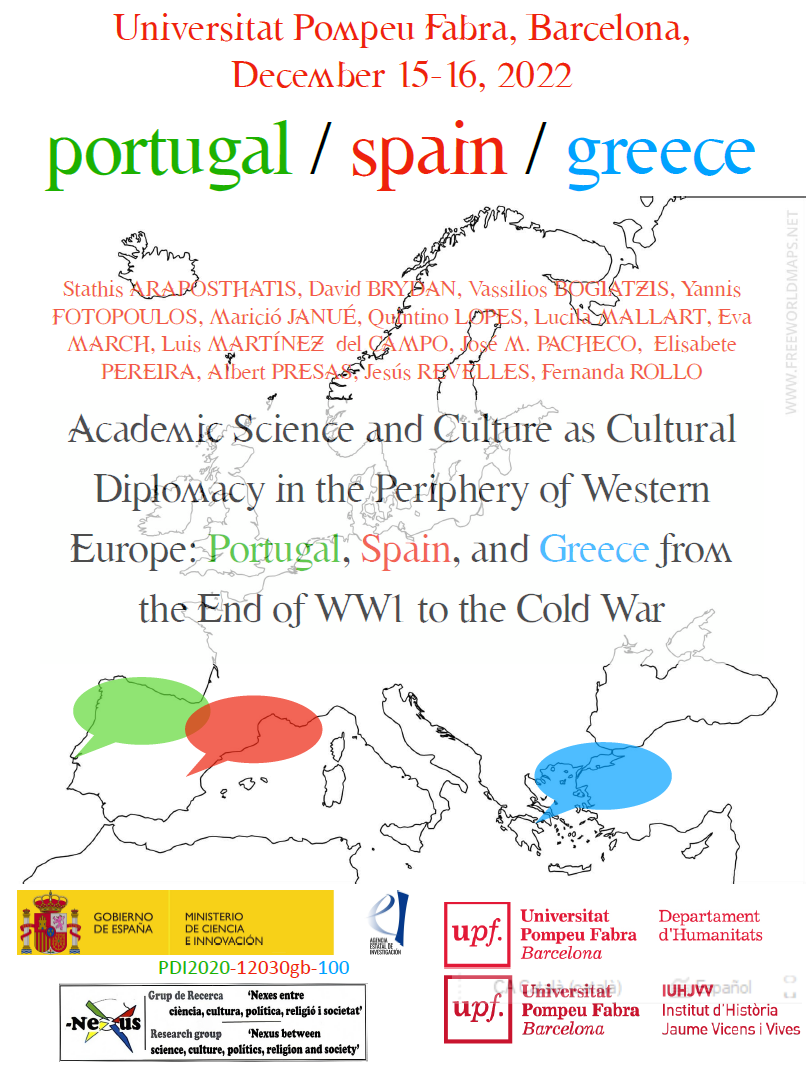Workshop: ACADEMIC SCIENCE AND CULTURE AS CULTURAL DIPLOMACY IN THE PERIPHERY OF WESTERN EUROPE: SPAIN, PORTUGAL, AND GREECE FROM THE END OF WORLD WAR I TO THE COLD WAR, UPF - December 15th - 16th 2022

The workshop is organized by the Nexus-UPF research group as an activity of a research project on Strategies of Spanish cultural diplomacy in the field of culture and academic science (1918-1975) (PDI2020-120301gb-100)
It focusses on the role of academic science and culture in the strategies for cultural diplomacy and soft power of Spain, Greece and Portugal in the period from WWI until the end of the first phase of the Cold War.
Until now, historiography on cultural diplomacy has focused primarily on the agency of the world's major powers, almost neglecting the role of these peripheral countries in the generation and dissemination of cultural and scientific products. The original contribution of the workshop will be the study of the role that cultural diplomacy played for these three Southern European countries in the considered period.
The symposium underlies a theoretical approach that considers, through the choice of exemplary cases, the analysis of the use by the three considered countries of culture and science as political resources in their international connections. The selected examples illustrate an integrative understanding in the study of cultural diplomacy, including science, technology and culture
The Symposium is structured in three sessions which respectively consider historical sub-periods marked by key historical events, e.g. WWI, the rise of Fascisms, and WW2 and the first years of the Cold War, that deeply impacted how international relations were understood. This impact included the consideration attributed by states and regimes to science and culture and the ways of producing it, as well as the enhanced relevance accorded to cultural diplomacy.
Contributions to the workshop are expected to consider the following approaches:
-
Scientists and cultural elites as representatives and agents of cultural diplomacy.
-
The relationship between scientific institutions and the practice of cultural diplomacy
-
State control over the symbolic messages of science and scientists
-
Referents and models of cultural diplomacy
-
Continuities and changes in strategies
-
Gender perspectives
-
Substate- and para-diplomatic issues in scientific and cultural matters.
The main objectives can be summarized in the following three:
-
To discuss the cultural and scientific diplomatic strategies these countries developed during the geopolitical transformations undergone in the considered time-window.
-
To analyse the relevance these countries accorded, respectively to cultural and scientific diplomacy in the course of the considered time frame.
-
To study the link between the evolution of the place these peripheral countries occupied, both in the Western context and in the international order, and their cultural diplomacy
With a broader insight, the Symposium aims to clarify the importance and interest of cultural diplomacy and the projection of soft power in international relations during the considered period by incorporating the perspective of the countries on the European Southern periphery.
Program
Thursday, December 15th 2022
9.30-9.40 Welcome and presentation of the workshop
Session 1. The integration in the transnational academic networks of the interwar period
Video session 1
|
9.45-10.25h. Art and art history as instruments of Catalan cultural diplomacy during the interwar period Eva March (UPF) |
|
|
10.30-11.10h International Congresses and Cultural Diplomacy in the History of Art and Architecture: Josep Puig i Cadafalch in Bucharest (1924) and Stockholm (1933) Lucila Mallart
|
|
| 11:15-11:35h Coffee break | |
|
11.40-12.20h L'Oficina d'Expansió Catalana, cultural diplomacy and Catalan Iberianism at the beginning of the 20th century Jesús Revelles Esquirol (Universitat de les Illes Balears) |
|
| 12.25-13.05h Discussion #1 | |
| 13.10-15.00h Lunch | |
|
15.05-15.45h ‘Blood and Culture’. Expatriates as Constitutive Elements of Spanish Cultural Diplomacy, 1921-1936 Luis G. Martínez del Campo (Universidad Complutense Madrid) |
|
|
15.50-16.30h Science diplomacy in a climate of nationalism: archaeology in Portugal between the wars Elisabete Pereira; Quintino Lopes (IHC I NOVA FC SH Lisboa/University of Évora) |
|
| 16.35-17.00h Discussion #2 | |
| 17.05-17.25h Coffee Break | |
Session 2. Flirting with Fascism and National Socialism
Video session 2
|
17'30-18'10h The offer of a cultural mission for the European "New Order": Spanish cultural and academic diplomacy with Nazi Germany Marició Janué (UPF) |
|
18.15-18.55h International References in the Intellectual Appropriation of Technology and Science in Interwar Greece Vassilios A. Bogiatzis (Panteion University. School of Political Sciences, Athens) |
| 19.00-19.25h Discussion #3 |
| 20.30h Workshop Dinner |
Friday 16th December 2022
9.00-9.10h Opening
Session 3. Adaptation and integration in the West in the aftermath of the Second World War and the first phase of the Cold War
Video session 3
|
9.15-9.55h Spanish science police as soft power: a permanent discontinuity Albert Presas i Puig (UPF) |
|
10.00-10.40h Lost in translation: No soft power for the Spanish version of Von Neumann´s Quantenmechanik José-Miguel Pacheco (Real Academia Canaria de Ciencias) |
| 10.45-11.15h Coffee break |
|
11.20-12.00h Spanish Health and Welfare Experts on the World Stage David Brydan (King's College London) |
| 12.05-12.45h Discussion #4 |
| 12.50-14.50h Lunch |
|
14.55-15.35h Between Dictatorship and Democracy: frameworks and dynamics of Portuguese cultural diplomacy between 1929 and 1986 Maria Fernanda Rollo (NOVA University of Lisbon) |
|
15.40-16.20h Techno-diplomacy and the making of the Telecom State in Greece from the1930s to the 1970s Yannis Fotopoulos; Stathis Arapostathis (National & Kapodistrian University of Athens) |
| 16.25-16.55h Coffee break |
| 17.00-17.25h Discussion #5 |
| 17.30-18.00h Conclusions of the workshop |
